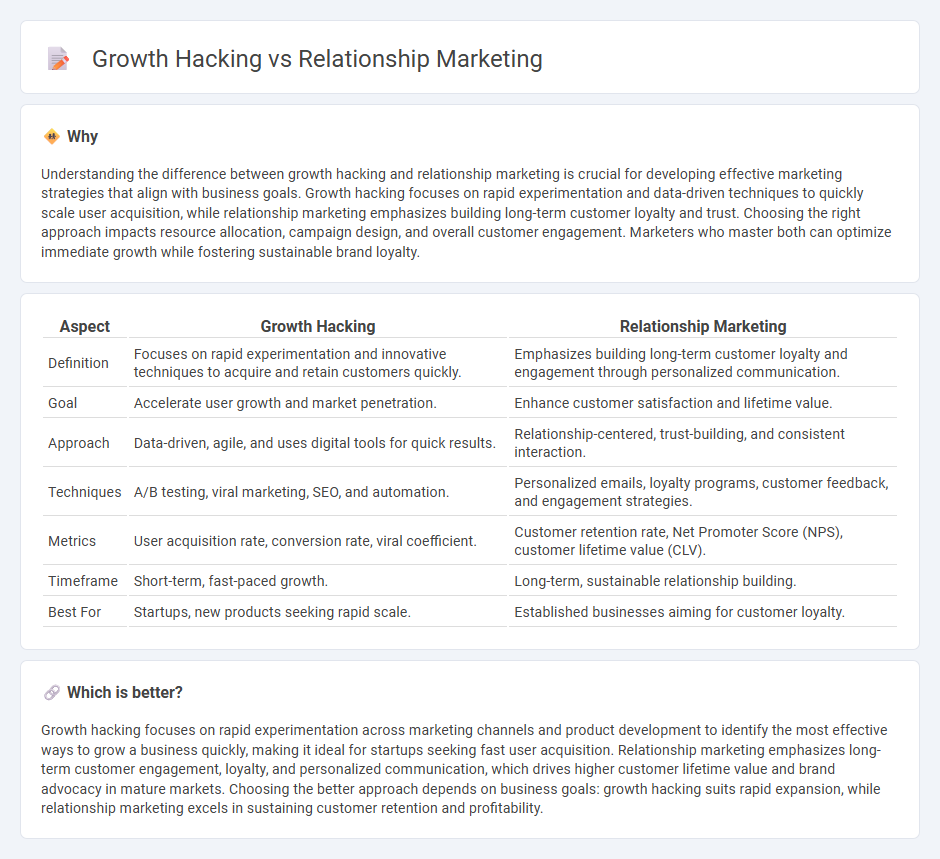
Growth hacking leverages data-driven tactics and rapid experimentation to accelerate customer acquisition and business expansion, focusing heavily on scalable digital channels and performance metrics. Relationship marketing prioritizes building long-term customer loyalty through personalized communication and trust, aiming to enhance lifetime value and reduce churn. Explore deeper strategies and examples to understand which approach aligns best with your business goals.
Why it is important
Understanding the difference between growth hacking and relationship marketing is crucial for developing effective marketing strategies that align with business goals. Growth hacking focuses on rapid experimentation and data-driven techniques to quickly scale user acquisition, while relationship marketing emphasizes building long-term customer loyalty and trust. Choosing the right approach impacts resource allocation, campaign design, and overall customer engagement. Marketers who master both can optimize immediate growth while fostering sustainable brand loyalty.
Comparison Table
| Aspect | Growth Hacking | Relationship Marketing |
|---|---|---|
| Definition | Focuses on rapid experimentation and innovative techniques to acquire and retain customers quickly. | Emphasizes building long-term customer loyalty and engagement through personalized communication. |
| Goal | Accelerate user growth and market penetration. | Enhance customer satisfaction and lifetime value. |
| Approach | Data-driven, agile, and uses digital tools for quick results. | Relationship-centered, trust-building, and consistent interaction. |
| Techniques | A/B testing, viral marketing, SEO, and automation. | Personalized emails, loyalty programs, customer feedback, and engagement strategies. |
| Metrics | User acquisition rate, conversion rate, viral coefficient. | Customer retention rate, Net Promoter Score (NPS), customer lifetime value (CLV). |
| Timeframe | Short-term, fast-paced growth. | Long-term, sustainable relationship building. |
| Best For | Startups, new products seeking rapid scale. | Established businesses aiming for customer loyalty. |
Which is better?
Growth hacking focuses on rapid experimentation across marketing channels and product development to identify the most effective ways to grow a business quickly, making it ideal for startups seeking fast user acquisition. Relationship marketing emphasizes long-term customer engagement, loyalty, and personalized communication, which drives higher customer lifetime value and brand advocacy in mature markets. Choosing the better approach depends on business goals: growth hacking suits rapid expansion, while relationship marketing excels in sustaining customer retention and profitability.
Connection
Growth hacking leverages data-driven experiments and innovative strategies to rapidly expand a customer base, while relationship marketing focuses on building long-term customer loyalty through personalized engagement. Both approaches prioritize customer insights and behavior analytics to optimize marketing ROI and enhance brand affinity. Integrating growth hacking techniques with relationship marketing strengthens customer acquisition and retention, driving sustainable business growth.
Key Terms
**Relationship Marketing:**
Relationship marketing emphasizes building long-term customer loyalty through personalized communication, trust, and engagement, leading to increased customer lifetime value and brand advocacy. It leverages data-driven insights to tailor experiences and foster emotional connections that drive repeat business and sustainable growth. Explore how relationship marketing strategies can transform customer retention and enhance your brand's competitive edge.
Customer Loyalty
Relationship marketing prioritizes building long-term customer loyalty through personalized engagement, consistent communication, and delivering ongoing value. Growth hacking emphasizes rapid experimentation and scalable tactics to acquire new customers quickly but may overlook deeper emotional connections that foster loyalty. Explore more to understand how balancing these strategies can maximize sustained customer retention and business growth.
Long-term Engagement
Relationship marketing prioritizes building strong, lasting connections with customers through personalized communication and consistent value delivery, fostering brand loyalty and repeat business. Growth hacking emphasizes rapid experimentation across marketing channels and product features to quickly acquire and retain users, often focusing on short-term gains. Discover how combining both strategies can maximize customer engagement and sustainable growth.
Source and External Links
What Is Relationship Marketing? | Definition from TechTarget - Relationship marketing focuses on building customer loyalty and long-term engagement through strong emotional connections, differing from transactional marketing which focuses on single sales, aiming to retain customers and foster ongoing business.
Relationship Marketing: 5 Ways to Create Lifelong Customers - It emphasizes creating emotional and purpose-driven connections with customers, leveraging brand communities, customer feedback, and exclusive offers to build loyalty, applicable in both B2C and B2B contexts.
Relationship Marketing: The Ultimate Guide | Referral Rock Blog - Relationship marketing aims to enhance customer retention, satisfaction, and lifetime value through personalized communication, loyalty programs, and improved customer service, resulting in higher revenue and reduced costs compared to acquiring new customers.
 dowidth.com
dowidth.com